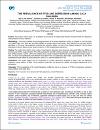The prevalence of ptsd and depression among Gaza children
Date
2019Metadata
Show full item recordAbstract
Purpose: The purpose of this study is to investigate the prevalence of posttraumatic distress disorder (PTSD) and depression among children in Gaza, Palestine. Methodology: This study assessed the psychological effects of the Israeli-Palestinian conflict on children in the Gaza Strip. 286 children aged 9-14 years old, who were exposed to a wide range of war events, were selected from the Gaza Strip to participate in this study. All participants conducted the following scales: the child PTSD Reaction Index(CPTSD-RI), Beck Depression Inventory (BDI), and the Arabic version for PTSD and depression assessment. Finding: The results show that the mean number of participants witnessing home destroyed and people killed was (88%) and home invasion (76%). Approximately 70% of the participants reported that they witnessed war violence against at least one of their family members. Further, 44 % of the children have a least one death in their family due to the Israeli invasion. Using t-tests, we found that significantly more females have both PTSD and depression than males. Approximately 32.8% of the participants met the criteria for severe depression, and 42.6 % met the criteria for PTSD. Implications: Our results suggest that it is imperative to provide intervention programs to treat PTSD and depression symptoms among children in Gaza. These programs should take into account the cultural and religious background of the participants. Originality: This investigation of the Israeli-Palestinian conflict has led to an increase in PTSD and depression symptoms among children in the Gaza Strip. - Hamza et al.
Collections
- Social Sciences [101 items ]


